
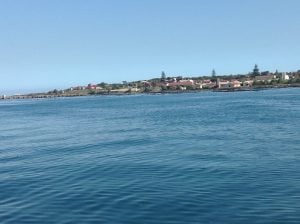
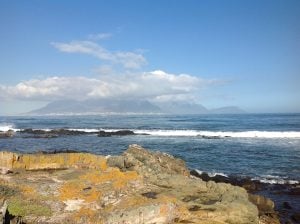
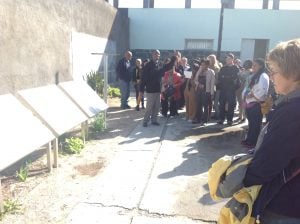
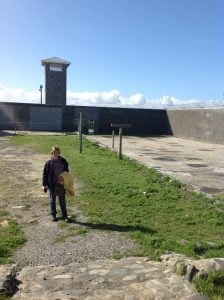
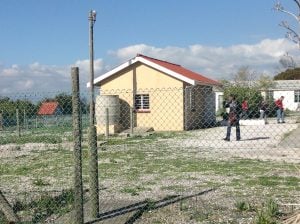
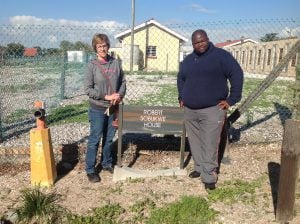

 Have you heard of Robert Sobukwe? I hadn’t until last year on Robben Island. If you pay attention to the world, you know that Robben Island (similar to our Alcatraz) was the prison island on which Nelson Mandela spent 18 of his 27 years of incarceration for standing up for freedom under the oppression of South African Apartheid.
Have you heard of Robert Sobukwe? I hadn’t until last year on Robben Island. If you pay attention to the world, you know that Robben Island (similar to our Alcatraz) was the prison island on which Nelson Mandela spent 18 of his 27 years of incarceration for standing up for freedom under the oppression of South African Apartheid.
Apartheid means, literally “apartness” in Afrikaans, and was the legal uber- segregation and brutality against offenders of the imposed laws of the Nationalist Party in power from 1948 until the 1990s.
Most of us are familiar the legacy of Nelson Mandela. But Robert Sobukwe? He was also on Robben Island. However, he was not necessarily a “prisoner.” He was detained in a house on the island in solitary confinement for seven years. Not a prisoner? Nope, he had already served the sentence he’d been given, in a few other institutions. He had done his time. He wasn’t released because government was afraid of what he WOULD do. Illegal? Yes, even in South Africa. So the parliament passed the “Robert Sobukwe Clause” which allowed them to detain someone who could be a treasonous threat.
Our guide last year (these pictures are all from 2013) showed us his house, inside and out, and told us about him. We learned that even Sobukwe’s guards were instructed not to converse with him. In the pictures here, you can see the prison yard where prisoners “broke rock” with hammers, Mandela’s cell, the long boat ride to the island, and the quarry where prisoners worked side-by-side. In the quarry picture, note the tiny cave on the left side. It was jokingly called the “ANC headquarters” because Mandela and other leaders would have discussions there.
Sobukwe, on the other hand, was another matter. First, he was a leader of the PAC (Pan Africanist Congress), not the ANC (African National Congress). He had spear-headed the protest against pass books required by every non-white person to be out of their designated townships past 6 p.m.; required to get a job, go to school, move anywhere, basically to be alive in the country. (Whites needed passes to go in the black or colored areas, too. Intermingling was strictly illegal).
Sobukwe urged people to stop by the police station on their way to work on March 21, 1960 without their passes, basically volunteering go to jail. A few thousand people across the country did so. One result: the Sharpeville Massacre, where 69 people
were gunned down as a result of the protest.
At any rate, many were jailed, many died in the ensuing weeks and years. Sobukwe (last photo above) was considered one of the most dangerous minds of the time. While Mandela and Sisilu and Tambo were able to occasionally communicate, Sobukwe was alone.
Three different guards/guides in two years gave us different impressions. One guard who was imprisoned on Robben Island while Sobukwe and Mandela were there seemed almost envious of the freedoms given Sobukwe–in his own house, with his own yard–while the rest of the prisoners were condemned to hard labor. He was adamant when I asked about Sobukwe, that I understood Robert “was not in solitary confinement in prison,” which could/would have been far worse. He was, instead, in solitary confinement in a tiny house within prison walls. Sobukwe was eventually released when his health started failing. He got his law degree after he was released, but he died of cancer a few years later.
He’s one of the heroes of South Africa that most of us in the U.S. have never heard of. I read his biography, How Can Man Die Better, by Benjamin Pogrund, while on the trip this year.
The title comes from the poem “Horatius” by Lord Macaulay:
Then out spake brave Horatius,
The Captain of the Gate:
“To every man upon this earth
Death cometh soon or late.
And how can man die better
Than facing fearful odds,
For the ashes of his fathers,
And the temples of his Gods…”
Pogrund, Benjamin. How Can Man Die Better: The Life of Robert Sobukwe. 1990.
Jonathan Ball Publishers, 2006. [Original Title: How Can Man Die
Better…:Sobukwe and Apartheid].



Subscribe To Rebecca'sNewsletter
Join the mailing list to receive the latest news and updates from Rebecca.
You have Successfully Subscribed!